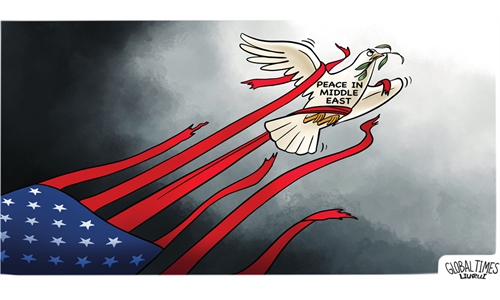
Palestinians inspect the damage following an Israeli airstrike on the Sousi mosque in Gaza City on October 9, 2023. Photo: AFP
Right after the surprise attack by Hamas on Israel on Saturday, US President Joe Biden vowed that his administration's support for Israel's security was "rock solid and unwavering" and that assistance was "on its way," with additional help forthcoming. The US has announced that it was moving an aircraft carrier strike group and military aircraft closer to Israel as a strong gesture of support.However, what we should anticipate is more chaos from the US political circle as the conflict persists. Niu Xinchun, a research fellow at the China Institute of Contemporary International Relations, told the Global Times that this is mainly a deterrent to prevent Iran from taking action amid this crisis.
According to Lü Xiang, a US studies research fellow at the Chinese Academy of Social Sciences, the support of the Biden administration for Israel appears to be more moral in nature. He believes that Washington has not shown the determination to take decisive action, nor has it presented a clear action plan.
Currently, the main focus of discussion in US political circles regarding the new round of conflict in the Gaza Strip is whether to attach Ukraine funding to a request for urgent aid to Israel as a strategy to pass both spending priorities. While the White House is considering this move, House Republicans warn sharply against it.
In terms of giving aid to Israel, the difference between the two parties is not as great when compared with giving aid to Ukraine. The US recently has already seen a heated debate over giving aid to Ukraine. Because most Republicans push for a significant reduction in Ukrainian aid, the US Congress last week had to remove Ukraine funding from a massive military spending bill to avoid a potential government shutdown. Linking the two aid requests once again shows fractured and desperate US politics.
Moreover, GOP politicians have taken the opportunity of the current situation in the Gaza Strip to vigorously attack the Democrats, especially the Biden administration. Republican candidates that want to unseat Biden quickly began to blame him for the crisis. In response, US Secretary of State Antony Blinken accused the Republicans of "playing politics" by attacking Biden. Obviously, the eruption of the Palestine-Israel conflict continues to fuel the growing polarization of the US bipartisanship.
This new round of the Palestine-Israel conflict shows that to seek peace in the Middle East, it is impossible to skip the tension between Palestine and Israel, a time bomb in the region. In its Middle East policy, the Biden administration has been proactively pushing for a détente between Saudi Arabia and Israel before next year's presidential election, aiming to boost his votes. But now, the escalation of the situation in the Middle East will, without question, hinder such a process, making Biden's plan wishful thinking.
As many people in the US criticized, the Biden administration's inability to manage the US' relationship with Iran has intensified the conflict between the two countries, instead of easing it.
Some observers worry that the conflict will distract attention from the war in Ukraine, and the US' support for Ukraine has already wavered, as war fatigue haunts the country. A recent Reuters/Ipsos poll has shown that support for supplying weapons to Ukraine is declining among Americans of both political parties. It is difficult for the US to "fight a two-front war" with its limited capacity of providing aid to foreign countries. And if the US planned to intervene in the Palestinian-Israeli conflict in any kind of form, it could be difficult for the Biden administration to wind things up - We still remember how US forces withdrew from Afghanistan helter-skelter two years ago.
The author is a reporter with the Global Times. opinion@globaltimes.com.


